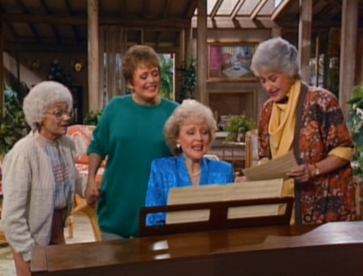The late actress and comedian was loved by millions, as was the hit TV show, for their open-mindedness and wholesome humor
By ANGIE CUMMINGS — arts@theaggie.org
Betty White was well known as the “First Lady of TV” for almost 70 years — playing witty characters across iconic sitcoms and movies, and bringing her own vibrant personality to late-night show appearances, game shows and award shows. White passed away on Dec. 31, 2021 at the age of 99, and her legacy of laughs lives on. Despite her extensive filmography, her most memorable role remains as Rose Nylund on “The Golden Girls” (1985-92). While it is possible that many people under the age of 45 have never seen a full episode of the show, it’s cultural impact is undeniable both in the world of sitcoms and general pop culture.
A show about five women (at least) over the age of 50 living together might not sound like the premise of a hit (and fairly progressive) TV show, but after watching just a few minutes, it’s clear that these women are some incredibly quick-witted and intelligent comedians. The simple fact that there was a show centered around the friendship of older women post-marriage running for almost a decade goes against most of what Hollywood was built on (young women and a dependency on men).
The show tackled important issues with immense care, including an episode revolving around Maude’s (one of the five main characters) abortion, and an episode where Rose had to take an HIV test, illustrating to viewers how this disease could infect anyone, and it was not restricted to the LGBTQ+ community as most media would have audiences believe. Both instances led to backlash from many network affiliates, but ended up boosting ratings in the long-run. Their sharp wit and willingness to discuss real issues like these are parts of why the show and the women behind it were instantly embraced by the LGBTQ+ community, and cemented it as an integral part of the culture. In response, White and the other four actresses didn’t shy away from their status as icons, but rather, understood the positive impact their show had on so many.
White’s character on the show, Rose, comes off first as an elderly former “bimbo,” but under that sweet smile is a sassy and smart comedian. Rose is known to throw a perfectly pointed dig at a friend with her typical smile on her face; a form of humor many are familiar with as “throwing shade,” but at the time was not exactly the norm for older women on TV. This is perhaps what we all know White best for: being America’s grandma with no filter, in addition to her legendary 2010 Snickers Superbowl ad in which we watched her play a muddy game of football.
Illustrated in “Golden Girls,” and throughout the latter half of White’s long career, we see an older woman uninhibited by the expectations put on her about her age, especially the concept that older women should no longer be sexual beings. This is something many praise the show for immensely, as up to that point women over 40 were typically only depicted as mothers, nurses, teachers, or as a punchline, a single and lonely cat lady. Only one of the five women ended up married at the end of the show, but between them, there were over 200 men who came through the show as dates (not many lasting more than a few episodes). This show proved what many already knew: Old ladies are really good at having fun (and pretty good at throwing shade).
White had a long and illustrious career in what can often be seen as a very harsh industry, but up until her very last appearance at the 2018 Emmy Awards she was cracking jokes and radiating positivity. Besides being a top-tier comedian since the 1950s, White always had a heart of gold, known for her kindness, humility and acceptance of everyone. Back in 1954, White had Arthur Duncan, a Black singer and tap dancer on her variety show, “The Betty White Show,” which led many networks (predominantly in the South) to threaten to not air her show, but nevertheless she fought to keep Duncan on her show.
White perfectly disproves the idea that ignorance is a generational side effect, but rather a choice. She possessed the simple things like empathy, decency and just a general moral backbone, only bolstering her generation-spanning icon status.
Written by: Angie Cummings — arts@theaggie.org




